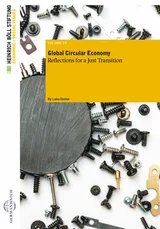Eine Kreislaufwirtschaft kann dazu beitragen, die schwerwiegenden Auswirkungen unseres Ressourcenverbrauchs zu verhindern, und sie kann eine Lösung für die massive Abhängigkeit von Rohstoffen aus anderen Ländern sein. Die EU hat seit dem Start ihres Aktionsplans für eine Kreislaufwirtschaft im Jahr 2015 mehrere Maßnahmen dafür vorgeschlagen, darunter eine Initiative, die sich mit einem nachhaltigen Design von Produkten befasst, und ein „Recht auf Reparatur“.
Mit dieser Studie möchten wir die verschiedenen Facetten einer Kreislaufwirtschaft näher beleuchten und das Bewusstsein für mögliche Fallstricke in Bezug auf Gerechtigkeit und zunehmende Ungleichheiten schärfen, verschiedene Lösungen aufzeigen und eine Debatte darüber anstoßen, wie wir gemeinsam eine gerechte und effektive globale Kreislaufwirtschaft schaffen können.
Produktdetails
Inhaltsverzeichnis
Preface
Abbreviations
- Introduction 9
A Just Transition to a Circular Economy is not a sure-fire guarantee
Electronic and electric equipment in focus
- The future of global value creation and capture and the global division of labour
Opportunity 1: The circular advantage
Opportunity 2: The growing global market for secondary raw materials
Opportunity 3: Ecodesign
Risk 1: Resource (in)justice
Risk 2: Primacy of European industry and consumers
Risk 3: Job inequality
- Global environmental and health effects of European Circular Economy policies
Opportunity 4: Circular legislations reduce environmental damage and health risks
Opportunity 5: Environmental externalisation of waste problem decreases
Risk 4: Undermining of the waste hierarchy due to purely national approaches
Risk 5: Material demand leakages
- Considerations for distributive and procedural justice
- Outlook
Use inclusive international dialogue, conferences, agreements and resolutions to shape the transition
Mainstream spill-over analysis of Circular Economy policies in the EU
Align development cooperation with a Just Transition to a Circular Economy
Introduce compensation schemes to ensure long-term financing of circular infrastructure in the L(M)ICs to which UEEE and e-waste are exported
Fund research to better understand the dimensions of a global Just Transition to a Circular Economy and include researchers in L(M)ICs
Adapt international raw materials diplomacy and trade policies to circularity
Work towards reducing raw materials demand to a consumption level within planetary boundaries
References
